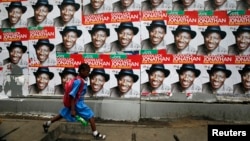In northeast Nigeria, insurgent group Boko Haram group has distributed leaflets warning people to boycott the March 28 nationwide elections. But that is not the only threat to security, People are moving their families away from sites of possible tension around the country and are preparing for unrest once results are announced.
From the Niger Delta to far northeast, the pre-election period has become a time of migration for some Nigerians. VOA met several on the streets of Kaduna.
“My wife has been pestering me for the past three months," said a man. "Even today, she called me to say 'Are we ready to move to a safer ground?'”
“Nobody wants to die for nothing. I myself, I am planning to relocate to the southern part of Kaduna where I will not be hearing sounds of war, drums of crisis, burning of tires and teargas, and all those kind of things,” said a woman.
“If before the elections, they are already tearing posters, burning cars, injuring people and already being violent before the election, then anything can happen either during or after the elections,” said another man.
Nigeria’s last nationwide vote in 2011 was praised as more credible than any before it. But more than 1,000 people were killed, most of them during post-election violence, and mostly in Kaduna state where politics sparked and communal tensions.
The 2015 elections are shaping up to be the most hotly contested in Nigeria’s democratic history. President Goodluck Jonathan and ruling PDP party are facing a strong challenge from the opposition APC and its candidate, former military ruler Muhammadu Buhari.
Voters are nervous about the post-election period.
“We will take our time. We will go and vote and we will stay back inside our houses and we will look on how the election and the outcome of it will be, but certainly we have to go and vote,” said a voter.
Nigeria’s police chief issued a statement this month trying to reassure voters and calling for them to stop relocating.
But the pre-election incidents have been piling up. Party headquarters have been bombed or vandalized. Opposition supporters said they have been attacked in Rivers state. A suicide bomber blew herself up in Gombe as President Goodluck Jonathan finished his rally there.
Nigeria’s National Human Rights Commission said at least 58 people have been killed in pre-election violence since December. Lagos, Kaduna and Rivers state, it said, have had the most incidents.
Nigeria's electoral commission postponed the polls by six weeks to March 28 after security forces said they needed more time to fight Boko Haram in the northeast and ensure voting is safe.
Ardo Hazzad reported from Bauchi. Ibrahima Yakubu reported from Kaduna. Hilary Uguru reported from Benue.




